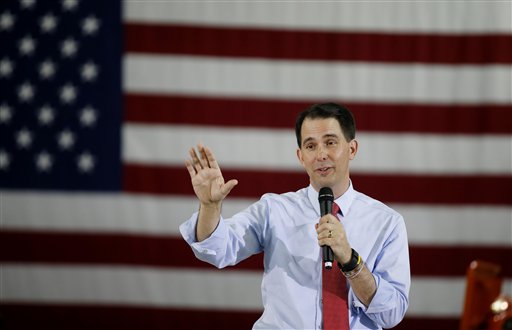Advocates on all sides of the campaign finance debate are watching Wisconsin, where new laws are removing limits on the use and reporting of “dark money” from secret sources.
The laws enable coordination between political campaigns and advocacy organizations, something almost all other states forbid.
Wisconsin, like other states, limits how much money individuals can contribute to the campaign committees for political candidates and ballot measures. It also requires campaigns to disclose their contributors. Nonprofit advocacy groups, on the other hand, are usually able to accept unlimited donations, and are not required to report where the money came from, even when it is used to influence elections.
Wisconsin’s new laws explicitly allow coordination, as long as the advocacy group doesn’t call specifically for the election or defeat of a candidate, or the approval or rejection of a ballot measure. The legislation also replaces a nonpartisan election law enforcement commission with two partisan boards, and stops requiring campaigns to disclose the employers of people who donate more than $100.
GOP majorities in both houses approved the legislation for Gov. Scott Walker’s signature after an outside group connected to the billionaire Koch brothers was accused of illegally coordinating with the governor’s successful campaign against a recall effort in 2012.
Jay Heck, executive director of Common Cause Wisconsin, was among those who lobbied against loosening the rules.
“If you legalize the coordination, why would you give $20,000 to Walker when you could give $20,000 to an issue ad group and not have your name disclosed — or you could give an unlimited amount to that same group?” Heck asked. “It would be stupid to have your name out there if you could do it secretly.”
Florida already allows such coordination, and New Mexico doesn’t explicitly prohibit it. Two years ago, Michigan adopted a law clarifying that groups are not required to reveal their donors if their issue ads don’t explicitly say which way to vote. Heck worries that the addition of Wisconsin could set a more widespread precedent.
David Keating, the president of the Center for Competitive Politics in Alexandria, Virginia, hopes it does. He said campaign finance restrictions can amount to constraints on free speech.
“We’re going to tell people to look at what Wisconsin did,” Keating said. “It’s actually quite good.”
The legal case that prompted the change involved Wisconsin Club for Growth, which is registered as a social welfare group, so its donor list is filed with the IRS but not made public. The state Supreme Court ultimately decided that neither Walker nor the group broke laws, and ruled certain state finance laws unconstitutional.
The group’s director, Eric O’Keefe, denied coordinating with the governor’s campaign, and said he would not do so even if the law allows it, because his group needs to be seen as independent of any particular candidate. “I don’t want to yield the brand or influence,” he said.
Heather Weininger, executive director of Wisconsin Right to Life, also said her organization does not plan to coordinate with candidates, but she said the new laws are important because they will enable her group to reach its members and the public without restrictions before elections.
Copyright 2015 The Associated Press. All rights reserved. This material may not be published, broadcast, rewritten or redistributed.









